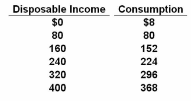It has been observed in country X that with an increase in college enrollment over a period of six years, the demand for televisions has also increased
Would it be right to conclude that the increase in college enrollment has caused the increase in demand for televisions? Why or why not?
The error in drawing such a conclusion is that the increase in both the variables may represent a correlation and not necessarily a causal relationship. Although both the variables move together, it would be wrong to conclude that an increase in college enrollment is causing an increase in the demand for televisions. There may be other omitted variables such as changes in the per capita income in country X, or changes in the price of satellite television connection over the period of six years.
You might also like to view...
Comment on the following statement: "The shape of a firm's long-run average cost curve is determined by both external and internal economies (or diseconomies) of scale."
What will be an ideal response?
Refer to the data above. If plotted on a graph, the slope of the consumption schedule would be:

The disposable income (DI) and consumption (C) schedules are for a private, closed
economy. All figures are in billions of dollars.
A. .6
B. .7
C. .8
D. .9